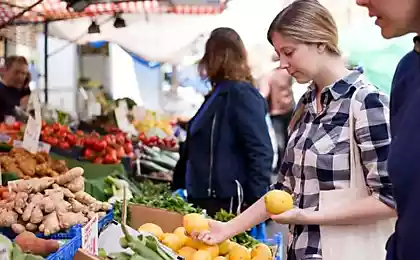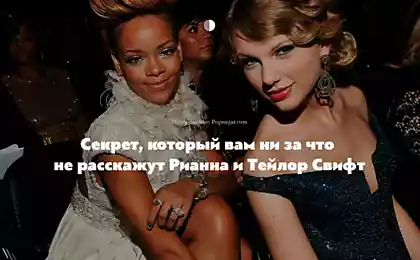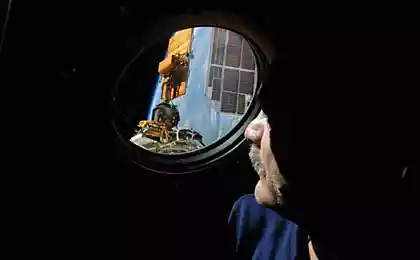667
About Soviet glassware and prices for it
Writes Oleg (oadam):
Any former Soviet man ever, but ran into these awful words, "Tara no" clumsily inscribed on a sheet from a notebook pinned to a closed window "Point for glass».
Toting this bag with bottles through three quarters, dragged, already considered in the mind "15 bottles of beer - is 1 ruble. 80 kopecks., 5 wine 0 7 - another 85 kopecks. Total: 2 rubles 85 kopecks. " If you cooperate with someone, then a bottle of "Moscow special" 4 rubles. 12 kopecks. enough for two. And then on for you - "Tara, no! '."
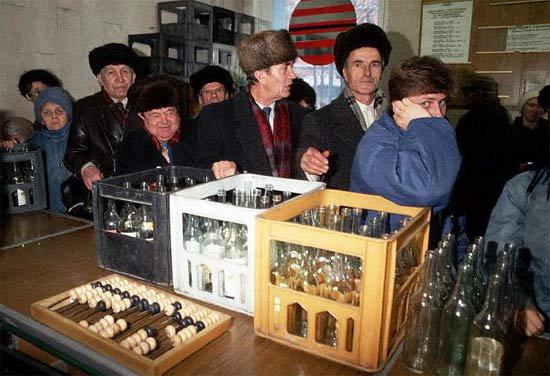
A soul asks sober. Well, what do I do? Like what! Knock on the window and asked: "And take 10?" To hear the answer to the coveted "Well, what you do ...". They said that the work on the Admission of glass able to do. Acceptance inspector took the dishes, looking into each bottle, and sometimes returning, "Shcherbatov not take," "Dirty do not take." Or carry it back or throw out immediately (he later picked them, of course - in order and finding fault).
At that time I was too young to have the very soul demanded opohmelki, but watched. Yes, I am watching ... and handed the bottle. Modern youth is hard to believe that 25 years ago are quite decent people (I myself do not mean), load bags of empty bottles and cans, went to the receiving points of glass. Because it was profitable.
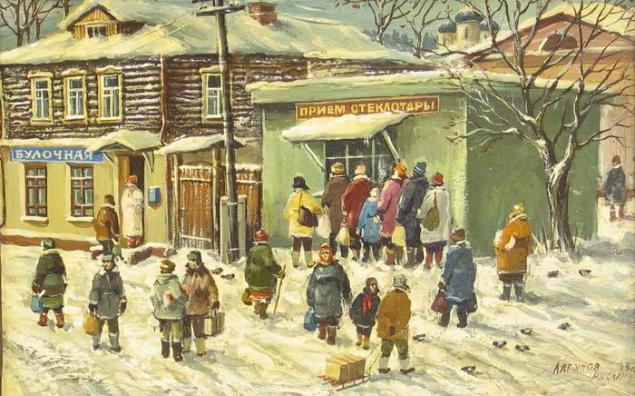
In the USSR in the room that were poured into a container - whether it's yogurt, mayonnaise, vodka and lemonade included Deposits capacity. We were told that in fact there are not so many bottles, but to irresponsible citizens not returnable glass bottles were thrown and hand over, we take a "pledge».
And then you come to the store and returned "to pledge" a bottle in exchange for money or a similar product bottle (bottle and took grocery differently: what you like, then only in return for a full bottle). And in the year that way in the 75th organized by the individual items of glass reception. And when the acceptance inspector from receiving dishes to say that he does not have containers - he meant that he had no boxes where to put empty bottles. No containers for packaging.
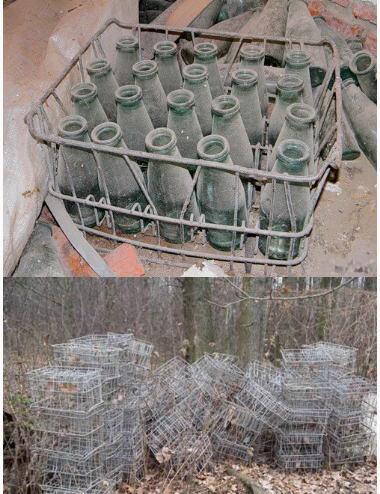
Price bottle was 4% of the price of vodka, about 10% of the price of cheap fortified wine, almost half the price of beer. Special chic is to drink as much wine to handed over to the dishes you could buy another bottle. This is called "second derivative».
Yogurt and milk cost 28 cents per half-liter bottle. That is, it was possible to bring the two empty bottles and get one full and 2 pennies delivery (I think it is because of these two cents the price of milk and yogurt and then raised to 30 cents).
Then takes the glass containers (previously The washed and peeled labels) at such prices:
- A bottle of vodka, wine, beer or lemonade 0, 5 liters. - Cost 12 kopecks. (but it's up to the September 1981 price increase on alcohol, when coupled with alcohol and increased collateral price for glass, which was estimated at 20 cents per bottle);
- A bottle of wine 0, 7 l - 17 kopecks .;
- A bottle of milk 0, 5 liters. -15 Cop .;
- A bottle of milk 1 0 l. - 20 kopecks .;
- Bank of sour cream - 10 kopecks .;
- Bank of mayonnaise - 3 cop. (Why, by the way, it is not clear - mayonnaise and sour cream, banks were almost identical);
- Bank simple liter - 10 kopecks .;
- Bank simple three-liter - 40 kopecks .;
These are the most popular varieties of dishes were also others. Bottles of champagne, and the other dishes were not taken illiquid, or rather taken by 10 kopecks, but in specific areas. As they say - to some "chemistry" (what it is, still does not know).
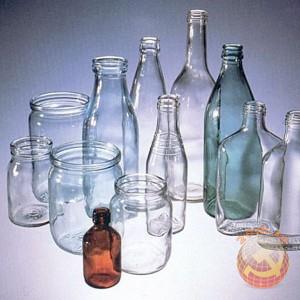
When people complained about the lack of money, he said: "Just go even hand over the bottle." And these were not just words - in the bottle handed could hold up to the salary. An empty beer bottle cost 20 kopecks, and a loaf of bread so. A bottle of milk cost 30 cents, plus two penny on the subway - surrendered three bottles of beer, and the day he lived. Do not die of hunger, at least.
But finding the "glass money" could be then. And if a glass of milk dishes followed thrifty woman, then drinking alcohol frivolous men, and often leave the bottle where they emptied they stuck out of the boxes, standing on a staircase, lay under the benches on the boulevards and the stadium stands. The bottles were where people were drinking.
And delivery of the bottles was a business - even said that there is a special "bottle mafia", and that the most fruitful territory carefully divided into spheres of influence and distributed among its "bottle collectors. I do not know, the mafia is not met, but the grandmothers with traditional: "Guys, I can take away the bottle?", Did not meet the only one who ever did not drink in the street at the time.
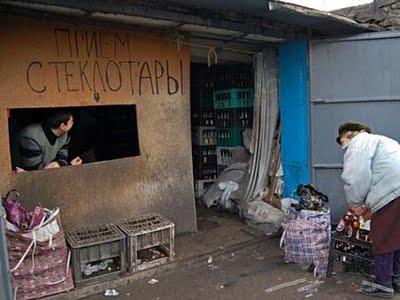
Popular trail to items for glass not overgrown now, but now are engaged in, or homeless, or people on a diet of wine and vodka, or part pensioners. The main reason for consumers to neglect the delivery of bottles covered in amazingly low price of glass - now 30 handed bottles of beer a day can not live. In Ukraine, an empty beer bottle stands as the Union - 20 cents, only Ukrainian. No matter how trying to come up with what you can buy with the money, so do not remember.
I'm not an economist, of course, but I think that something in the USSR, it was wrong. Probably should not have a loaf of bread sold for empty bottles. And now this is something wrong if anyone unnecessary empty glass bottles and litter strewn nature.
.
It is known that the glass does not decompose and can lie in the ground for thousands of years. There will be dozens of centuries, humanity can not be and romantically bury me in 1989, at Ai-Petri bottle from the "Soviet champagne", and would lie there.
Note with a declaration of love to the woman, whose name I remember now with difficulty, rot, and the bottle will stay ...
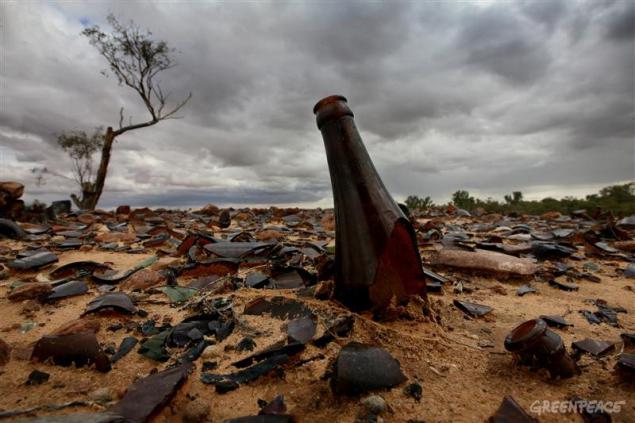
Source:
Any former Soviet man ever, but ran into these awful words, "Tara no" clumsily inscribed on a sheet from a notebook pinned to a closed window "Point for glass».
Toting this bag with bottles through three quarters, dragged, already considered in the mind "15 bottles of beer - is 1 ruble. 80 kopecks., 5 wine 0 7 - another 85 kopecks. Total: 2 rubles 85 kopecks. " If you cooperate with someone, then a bottle of "Moscow special" 4 rubles. 12 kopecks. enough for two. And then on for you - "Tara, no! '."

A soul asks sober. Well, what do I do? Like what! Knock on the window and asked: "And take 10?" To hear the answer to the coveted "Well, what you do ...". They said that the work on the Admission of glass able to do. Acceptance inspector took the dishes, looking into each bottle, and sometimes returning, "Shcherbatov not take," "Dirty do not take." Or carry it back or throw out immediately (he later picked them, of course - in order and finding fault).
At that time I was too young to have the very soul demanded opohmelki, but watched. Yes, I am watching ... and handed the bottle. Modern youth is hard to believe that 25 years ago are quite decent people (I myself do not mean), load bags of empty bottles and cans, went to the receiving points of glass. Because it was profitable.

In the USSR in the room that were poured into a container - whether it's yogurt, mayonnaise, vodka and lemonade included Deposits capacity. We were told that in fact there are not so many bottles, but to irresponsible citizens not returnable glass bottles were thrown and hand over, we take a "pledge».
And then you come to the store and returned "to pledge" a bottle in exchange for money or a similar product bottle (bottle and took grocery differently: what you like, then only in return for a full bottle). And in the year that way in the 75th organized by the individual items of glass reception. And when the acceptance inspector from receiving dishes to say that he does not have containers - he meant that he had no boxes where to put empty bottles. No containers for packaging.

Price bottle was 4% of the price of vodka, about 10% of the price of cheap fortified wine, almost half the price of beer. Special chic is to drink as much wine to handed over to the dishes you could buy another bottle. This is called "second derivative».
Yogurt and milk cost 28 cents per half-liter bottle. That is, it was possible to bring the two empty bottles and get one full and 2 pennies delivery (I think it is because of these two cents the price of milk and yogurt and then raised to 30 cents).
Then takes the glass containers (previously The washed and peeled labels) at such prices:
- A bottle of vodka, wine, beer or lemonade 0, 5 liters. - Cost 12 kopecks. (but it's up to the September 1981 price increase on alcohol, when coupled with alcohol and increased collateral price for glass, which was estimated at 20 cents per bottle);
- A bottle of wine 0, 7 l - 17 kopecks .;
- A bottle of milk 0, 5 liters. -15 Cop .;
- A bottle of milk 1 0 l. - 20 kopecks .;
- Bank of sour cream - 10 kopecks .;
- Bank of mayonnaise - 3 cop. (Why, by the way, it is not clear - mayonnaise and sour cream, banks were almost identical);
- Bank simple liter - 10 kopecks .;
- Bank simple three-liter - 40 kopecks .;
These are the most popular varieties of dishes were also others. Bottles of champagne, and the other dishes were not taken illiquid, or rather taken by 10 kopecks, but in specific areas. As they say - to some "chemistry" (what it is, still does not know).

When people complained about the lack of money, he said: "Just go even hand over the bottle." And these were not just words - in the bottle handed could hold up to the salary. An empty beer bottle cost 20 kopecks, and a loaf of bread so. A bottle of milk cost 30 cents, plus two penny on the subway - surrendered three bottles of beer, and the day he lived. Do not die of hunger, at least.
But finding the "glass money" could be then. And if a glass of milk dishes followed thrifty woman, then drinking alcohol frivolous men, and often leave the bottle where they emptied they stuck out of the boxes, standing on a staircase, lay under the benches on the boulevards and the stadium stands. The bottles were where people were drinking.
And delivery of the bottles was a business - even said that there is a special "bottle mafia", and that the most fruitful territory carefully divided into spheres of influence and distributed among its "bottle collectors. I do not know, the mafia is not met, but the grandmothers with traditional: "Guys, I can take away the bottle?", Did not meet the only one who ever did not drink in the street at the time.

Popular trail to items for glass not overgrown now, but now are engaged in, or homeless, or people on a diet of wine and vodka, or part pensioners. The main reason for consumers to neglect the delivery of bottles covered in amazingly low price of glass - now 30 handed bottles of beer a day can not live. In Ukraine, an empty beer bottle stands as the Union - 20 cents, only Ukrainian. No matter how trying to come up with what you can buy with the money, so do not remember.
I'm not an economist, of course, but I think that something in the USSR, it was wrong. Probably should not have a loaf of bread sold for empty bottles. And now this is something wrong if anyone unnecessary empty glass bottles and litter strewn nature.
.
It is known that the glass does not decompose and can lie in the ground for thousands of years. There will be dozens of centuries, humanity can not be and romantically bury me in 1989, at Ai-Petri bottle from the "Soviet champagne", and would lie there.
Note with a declaration of love to the woman, whose name I remember now with difficulty, rot, and the bottle will stay ...

Source:







